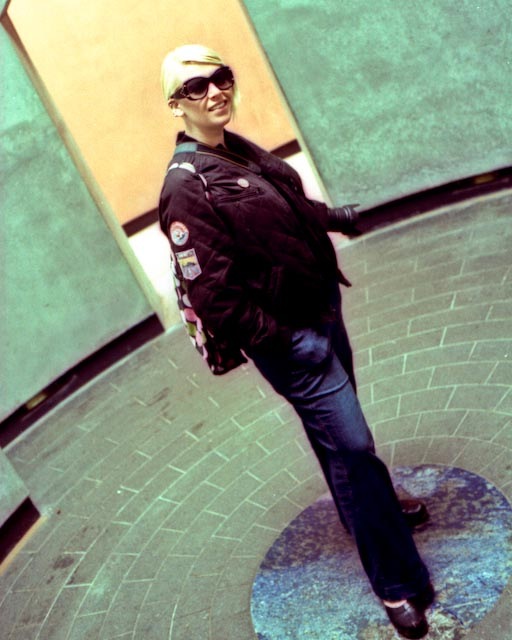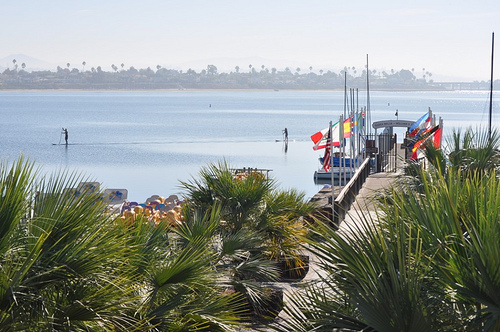
Rachael Faust is a JFKU museum studies graduate student. Previous to her academic studies, Rachael worked at the University Art Gallery at UCSD and at the Portland Art Museum. Since moving to the Bay Area, she has volunteered at the Phoebe A. Hearst Museum of Anthropology and has been an intern at SFMOMA and the Henry Art Gallery in Seattle.
By Rachael Faust
After completing my first year at John F. Kennedy University, I spent the summer coping with the fact that I would soon be faced with the daunting task of undertaking a thesis project. Summer came and went, and at the end, I found myself without a revelation of what this dynamic topic would be.
As fall quarter quickly approached and as people began to inquire about my amazingly innovative thesis topic, I quickly devised plan B: crashing the 2009 Western Museums Association annual conference in San Diego where I hoped to find a veritable assortment of fresh ideas and topics just waiting for further exploration. Plan B turned out to be far more effective than plan A (waiting for a revelation). I encourage my fellow grads who are still on plan A to stop waiting and quickly sign up for a museum conference.
Of all the conferences I could attend, I chose WMA because of the interesting and diverse session topics and the manageable size and length of the conference (the student discount price was also rather alluring). A preconference workshop titled, “Navigating New Media In Collections without Going Adrift,” caught my attention because my current studies focus on collections management and I have become particularly interested in the care and preservation of time-based media works.
The presenters for this session included registrars from MOMA and LACMA as well as LA MOCA’s media exhibition technician and an LA based freelance media specialist. I hoped that the information they presented in this session as well as the questions raised by the museum professionals in attendance would point to areas that needed further investigation (read: my fingers were crossed in hopes that they had an extraordinary thesis topic for me).
The preconference workshop not only gave me a handful of possible areas to research that could lead to relevant thesis topics, but also gave me an opportunity to test out a few of my own ideas.
- Is it possible for museums to share or loan exhibition media equipment to one another?
- How are museum staff being trained to handle, install, preserve, and repair media works and their related equipment?
- What happens when artists don’t want to migrate their media-based artwork to newer formats? The work will eventually die. Should museums collect works with such short life spans? Do museums continue to store the remains of the dead artwork?
I was able to ask these questions and others to a captive, knowledgeable audience that I may not have had access to otherwise; the dialogue I enjoyed with museum professionals at WMA could not have been easily facilitated on my own.
In the proceeding days at the conference, I ran into several of the speakers, and they all went out of their way to stop me and say, “hey, I was thinking about your questions and….” Everyone I introduced myself to at the conference was excited that I was a student and was eager to learn about my potential thesis work.
The WMA conference exposed me to new ideas, expanded ideas I had already been tinkering with, and provided access to museum professionals from a diverse range of museums. I left the conference with a direction for my thesis work and at least a dozen business cards of museum people who said they would be more than happy for me to contact them in the future.









Comments
A brilliant method of finding a thesis topic, Rachael! You have interview subjects built in from the start.
Rachael, this is so great to hear from an annual meeting newcomer that WMA Museum professionals are just as friendly and encouraging to you as they are to their long-established colleagues. I too love WMA for its global and lofty visions, for its regional accessibility and warmth, combined with a down-to-earth embrace for the profession and its practioners. And… it is so nice to get your thesis topic in a beautiful setting with nice people who care about you– Congrats!
Leave a Comment
Very cool! Both on the (awesome) thesis topic, and the valuable conference experience. I was sad not to have made it this year, but grateful that blog posts such as this one continue to keep the dialogue and sharing spirit of WMA up. Thank you Rachael!
Rachael, *thank you* for sharing your experience! I'm glad, but not surprised to hear how useful it was. Like you, I attended my first WMA conference at the beginning of my second year in grad school--and as a result, walked away with a thesis topic! Glad to hear that nothing much (that's good) has changed! :)
Add new comment